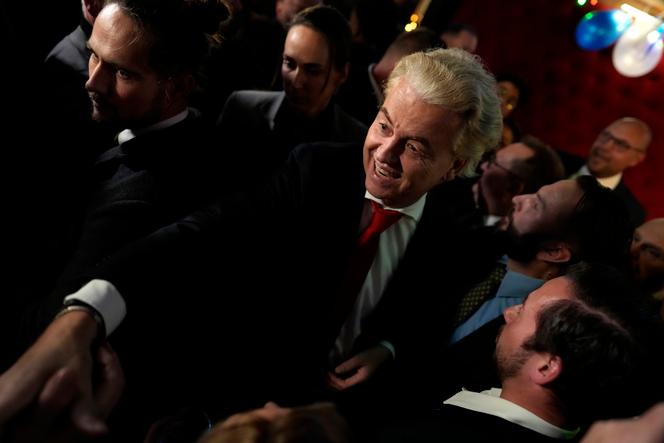


It took him almost 20 years to come to this conclusion, but the Dutch populist Geert Wilders now knows that changing his tone and abandoning some of the more extreme elements of his manifesto – banning the Koran or closing down mosques – has allowed him to achieve his goals, after a historic victory in the parliamentary elections on Wednesday, November 22.
His new credo – that "a party that wants to carry out its entire manifesto will never govern," as he recently explained – has resulted in a resounding victory for the Party for Freedom (PVV), the far-right party he founded in 2006. At the age of 60, this former member of the liberal party has finally persuaded a significant part of the Dutch electorate to bring him to power.
With 37 seats, Wilders did far better than one of his role models, Pim Fortuyn, whose anti-immigration message he has radicalized. When Fortuyn, a politician who campaigned on an aggressively nationalist platform, was assassinated in 2002 by an animal rights activist, he left his heirs 26 seats in parliament, but this list quickly sank.
After a few career highs (taking third place in the 2010 elections and second place in 2017) and quite a few lows (in March he obtained his worst-ever provincial election result), Wilders learned to put aside his outrageous claims about the European Union (a "Nazi state"), Moroccan youth ("street terrorists") or the Islamic veil ("head tea towels") and instead present himself as the defender of Dutch people, who he says are "worn down" by the supposed indifference of politicians to their everyday problems.
He has promised them better access to housing, healthcare and retirement homes, and greater security. He has also announced limits on immigration, identified as the number-one concern of a large section of the electorate.
At the start of his campaign, many Dutch citizens were tempted to vote for the PVV, but feared that this vote would be wasted if Wilders was once again confined to an opposition role. In August, Dilan Yeşilgöz-Zegerius, the outgoing minister of justice, helped change the course of events. The leader of the liberal People's Party for Freedom and Democracy (VVD), who succeeded Mark Rutte, aimed to position herself further to the right of the outgoing prime minister. To this end, she raised the possibility of a coalition bringing together the liberals and Wilders.
The prospect of a government primarily concerned with reducing immigration appeared to legitimize the PVV, reinforced the traditional VVD electorate's belief that a rapprochement with the far right was possible, even necessary. Long tipped to win, her party eventually collapsed: according to one estimate, 19% of the VVD's usual voters switched to Wilders' party. Shortly before the election, the liberal leader attempted to backtrack, saying she would not take part in a government led by her rival, but no one was listening anymore. The extremist leader's advance could no longer be stopped.
You have 35% of this article left to read. The rest is for subscribers only.
